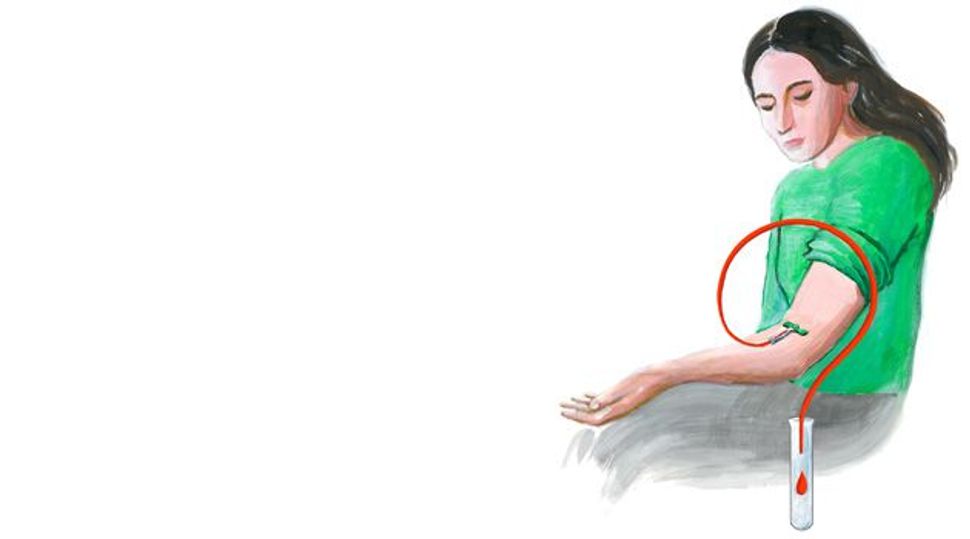Karen Iris Tucker
By Karen Iris Tucker
-

Culture Sitting Shiva for Spot?
As I peer down at her cotton-puff head, my sense of guilt sets in. Peeps, my bichon frise associate, has just taken a cocktail of three different medicines meant to keep her ticker ticking. Her eyes water, and her mouth turns downward, quivering slightly. It’s obvious she is not digging this new regimen. At 13,…
-
Culture Harvey Singer Caught His Prostate Cancer Early. Here’s How.
When the Forward first wrote about Harvey Singer two years ago, he shared his trials of being diagnosed with breast cancer in 2008. The Rochester, New York, resident opted for a full mastectomy, only to be diagnosed with prostate cancer 18 months later. Recently, we learned that Singer faced yet another monumental health scare after…
-
Culture Watch Out Men, Breast Cancer Gene Can Get You Too
Cancer kept Angel Moses busy. Before even completing the five-year treatment for breast cancer after she was diagnosed in 2003, the disease recurred in the original breast and a new cancer developed in the other. The Chicago resident first found she had the disease when she was just 38. Her age and the occurrence of…
-

Culture Why We Have To Talk About Cancer
Having grown up within the Orthodox Jewish enclave of Midwood in Brooklyn, Rifky Tkatch, a social psychologist, knew that many in her community did not like to talk about cancer. Yet it wasn’t until she conducted focus group interviews with Orthodox Jewish women in Detroit in 2011 that she uncovered barriers to screening that stunned…
-

News Breast Cancer Panel May Force Women To Pay for Mammography Screenings
A coalition of politicians from both sides of the aisle are deeply concerned about new recommendations for breast cancer screening. They, along with patient advocates, say the new guidelines from the United States Preventive Services Task Force will fail to protect populations with a hereditary predisposition, including Ashkenazim, one of the groups at higher risk…
-

News Should More Ashkenazi Jews Get Tested for Cancer-Causing BRCA Gene Mutations?
A new initiative offering subsidized screening for cancer-causing mutations in Ashkenazi Jews — including those with no family history of cancer — appears to be splitting cancer specialists. The BRCA community study, sponsored by the Program for Jewish Genetic Health, began accepting applicants in January from Ashkenazi women and men age 25 and older. Led…
-

News Should All Ashkenazi Women Get Tested for BRCA Gene Mutations?
No family history of cancer? Get tested anyway suggests a recently-published study, but medical experts are deeply divided. The study indicates that even Ashkenazi women with no family history of the disease but who test positive for a cancer-causing genetic mutation have high rates of breast and ovarian cancer. At the heart of the dispute…
-

Culture How Angelina Jolie Changed Things For People With BRCA Mutations
“I can tell my children that they don’t need to fear they will lose me to breast cancer,” said actress Angelina Jolie last May when she announced that she underwent a preventive double mastectomy. Describing her pervasive family history of breast and ovarian cancer in a New York Times op-ed, Jolie said that she had…
Most Popular
- 1

News No Jews allowed: White supremacists are building a segregated community in Arkansas, but is it legal?
- 2

News Zohran Mamdani has represented Astoria’s Jews for 4 years. What do they think of him?
- 3

News Curtis Sliwa has a plan to beat Zohran Mamdani in NYC mayor’s race — and it starts with apologizing to Jews
- 4

Culture Barbra Streisand’s brand-new duet with Bob Dylan is a whole lot different than you might think
In Case You Missed It
-

Opinion Right-wing insurrectionists tried to topple the German government in 1920 — it’s happening again in Trump’s America
-

Theater Can a kinky new Yiddish musical resurrect a lost art — and one man who got spanked to death?
-

Fast Forward Josh Shapiro’s Judaism was not why Kamala Harris snubbed him, new book claims
-

Yiddish דאָקטוירים פֿון אַן אַנדער שניטDoctors of a different sort
די ווילנער דאָקטוירים יעקבֿ וויגאָדסקי און צמח שאַבאַד זענען אויך געווען געזעלשאַפֿטלעכע טוער.
-
Shop the Forward Store
100% of profits support our journalism









